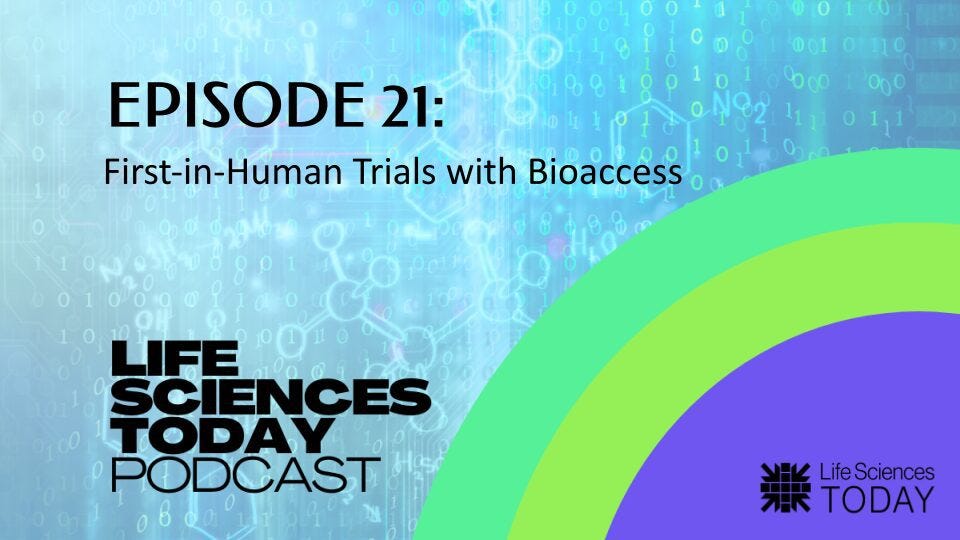TechBio Founders win with this in 2026
Inside the TechBio founder's mind: what they told me they must do for their customers in the next 12–18 months — and why it matters for you.
Courtesy: Pixabay
This week on Life Sciences Today
This week’s Life Sciences Today podcast features Julio Martinez, CEO of Bioaccess — a CRO that fast-tracks first-in-human trials in Latin America 40% faster than the US/EU.
When I asked Julio about his secret sauce, he answered in one word: partnerships.
He said to me, “take Colombia for example - we do a lot of clinical trials there. When we do trials in Columbia we bring cutting edge treatments to patients and create a new revenue channel for hospitals”.
Patients benefit from:
Improved access to healthcare
Better quality of care
Transportation support
Comprehensive medical services
Research sites benefit from:
New revenue channel
Knowledge transfer
International exposure
Quality certification opportunities
It’s a win-win model where sites, patients, and sponsors all move forward faster.
🎧 You can hear the full conversation with Julio here - First in Human trials with Biaccess
Partnerships emerged as one of the most important themes when I asked dozens of TechBio founders who were my guests on the podcast what they want to achieve for their customers in the next 12–18 months.
Julio’s story is one example.
What follows is the bigger picture: the 10 founder-driven plays that will shape TechBio in 2026.
10 founder-driven plays that will shape TechBio in 2026
1. Automation Is Not Optional Anymore
“If we can’t deliver 10x productivity gains without adding headcount, we’re dead in the water.” – Tilda Health
From AI agents to data pipelines that clean and harmonize millions of healthcare records, automation has moved from “nice to have” to the only way to compete.
If your workflows still depend on billable hours, you’re already behind.
2. Data quality is more than GCP compliance - it’s part of your product
“Our job isn’t just to clean the data. It’s to turn it into an asset the business can monetize.” – Cornerstone AI
Debiopharm is building a “Data Fabric” to make trial data instantly usable across omics and clinical datasets.
Genialis is a precision oncology company helping the most promising molecules become life-saving medicines using the Genialis™ Supermodel - A foundation model of cancer biology.
Trained on hundreds of thousands of RNA sequencing samples, this large molecular model (LMM) defines a comprehensive landscape of cancer biology, learned from preclinical, single-cell, and globally diverse patient records. The LMM maps each new patient sample into this high-dimensional space, revealing its underlying biological states and processes. Genialis is refining biomarkers so they actually get adopted in active trials using their AI super model.
Delve Health takes a technology-first approach to clinical trials, with FDA-grade wearable devices for home monitoring. The Delve system uses 32 AI agents that engage all stakeholders (patients, caregivers, sites) based on study data.
Your data is your product. You win with good data and lose deals with bad data.
3. Decentralization Needs Proof, Not Hype
“We’re done selling the concept. Now we’re proving which elements actually work — and publishing the results.” – Medable
Medable is running studies with Tufts, MRCT, and Duke to measure which decentralized trial components boost retention, compliance, and site adoption.
2026 will reward founders who bring evidence, not just enablement.
4. Scale without losing your way
“We refuse to become the bloated CROs we were built to replace.” – Lindus
Promise Bio and Lindus are asking the same question: How do you grow without diluting the culture, quality, and focus that made you competitive in the first place?
Growth is not a license to forget your edge. Protect it like IP.
5. Plant seeds for your second act early
“Oncology was the starting point. But our platform works in immunology and rare disease too — and those moves start now.” – Genialis
Polypid is taking its drug delivery platform into oncology and orthopedics before its first products peak. Quanthealth is moving downstream from Phase 2 and Phase 3 trial success prediction to Phase 1.
The best time to expand into adjacencies is before you need them.
6. Partner to Go Faster
“Alone, we’d take 3 years to do this. With the right partner, we can do it in 12 months.” – Polypid
Academic alliances, medtech collaborations, and pharma co-development are becoming the fastest path to market access. Salt AI is even using partnerships as its core customer acquisition engine.
If you’re building alone, you’re moving slow.
7. Ship Proof Points That Move the Market
“Our LCA5 readout will tell investors everything they need to know about our platform.” – Opus Genetics
First-in-human trials, data readouts, and early launches are the credibility currency for 2026 fundraising.
Design for visible wins that change the conversation.
8. Win Through human relationships
“I don’t do cold outreach. I invest in people — and the business follows.” – Amir, Chief Scientist @ ai.science
In long-cycle, high-stakes B2B like life sciences, and enterprise AI, human trust beats marketing tactics.
2026 will belong to founders who can sell without selling.
9. Turn Services Into Products
“When we can package our biz-dev expertise so clients can launch a new division without hiring us full-time, we win.” – Tigran Arzumanov, biz dev as a service for life science companies
From “biz dev in a box” to data fabrics, the move is away from labor-heavy consulting and toward repeatable, scalable value delivery.
Productized services scale without headcount drag.
10. Build an Investor-Ready Narrative Before You Need It
“Even if we’re not raising now, the story we’re telling is what we’ll be measured against.” – Cornerstone AI
The best founders aren’t waiting until the Series B to craft their investor story. They’re using it as an operating plan now.
Your story isn’t just for fundraising — it’s your roadmap.
The 2026 Pattern
When you strip away the details, it’s the same four forces everywhere:
Speed – through automation and partnerships.
Proof – measurable outcomes and adoption data.
Focus – scaling without drift.
Reach – adjacencies, markets, and repeatable delivery.
Techbio leaders. The question is: which two will you master — and which two will you outsource or partner for?
About Me
I’m a former pharma-tech founder who bootstrapped to exit.
Now I run a private community with 900+ life science leaders helping them maximize their revenue with the right partners.
I hear these insights first-hand every week from the founders building the future of TechBio. If you want to get them before your competitors do, join my private network for techbio entrepreneurs.
If you are a techbio leader contact me here to be a guest on the Life Sciences Today podcast.
About Bioaccess
Bioaccess fast-tracks first-in-human trials in Latin America, Eastern Europe & Australia-40% faster than in the US and Europe. Device sponsors slash timelines by 6–12 months with bioaccess®’s proven model: ethics approvals in 4–8 weeks, 30% lower costs, and FDA/EMA-ready data.
🔗 Visit Bioaccess



